










 Ukraine
Prayfor Slava Ukraini
Ukraine
Prayfor Slava Ukraini












 Ukraine
Prayfor Slava Ukraini
Ukraine
Prayfor Slava Ukraini

WeSupportYour RighttobeFree


OMTimesMediaisamultiplatformpublisherandaleaderin conscious,holistic,andspiritual media.Itaimstoredefinethe paradigmofmediabycombining printanddigitalcontentwitha focusonholisticlivingand spiritualwellness.

OMTimes Media represents a comprehensive and integrative approach to media, focusing on content that uplifts, educates, and connects individuals who are passionate about a conscious, spiritual lifestyle.
OMTimes emphasizes content that nurtures personal growth, spiritual enlightenment, and holistic well-being. This includes articles, features, and resources on topics like mindfulness, yoga, spirituality, wellness, and sustainable living.
While it began as a magazine, OMTimes has expanded its reach through various digital platforms. This includes an online presence with digital articles and resources, social media engagement, and multimedia content like Live Radio, podcasts, and OMTimes TV and videos.
Inredefiningitsservices,OMTimesMediaoffers diversecontentandcreatesacomprehensive ecosystemforindividualsseekingaholisticand spirituallyalignedlifestyle.Thismultifaceted approachcaterstoarangeofpreferencesand learningstyles,deepeningtheimpactoftheir mission.
OMTimeslikelyprovidesadvertising opportunitiesforbusinessesandpractitioners intheholisticandspiritualspace.Thiscould includemagazineads,sponsoredcontenton theirdigitalplatforms,andpromotional segmentsintheirpodcastsorTVservices.
CommunityTrust:Advertiserscouldbenefitfrom thetrustandnicheaudiencethatOMTimeshas cultivated,reachingpotentialcustomerswho arespecificallyinterestedinconsciousliving andspirituality.
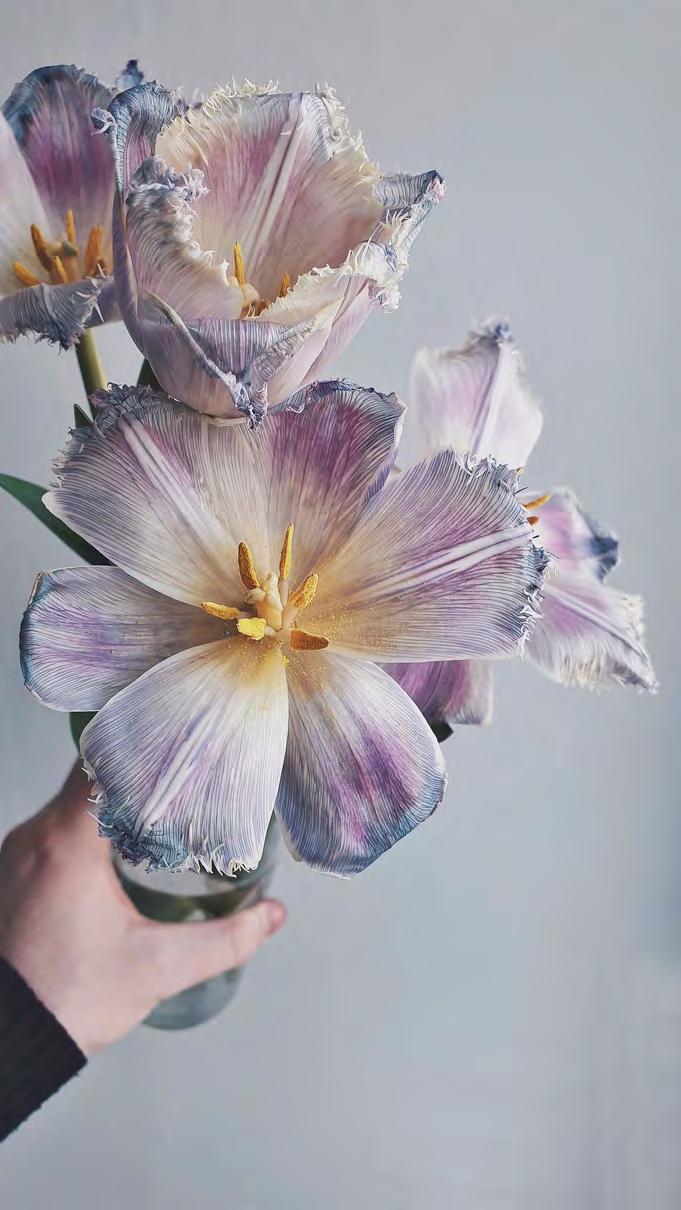



New The Ommie Awards and The Conscious Media recognize and honor Minds, Influencers, and the Conscious, Spiritual Communities.
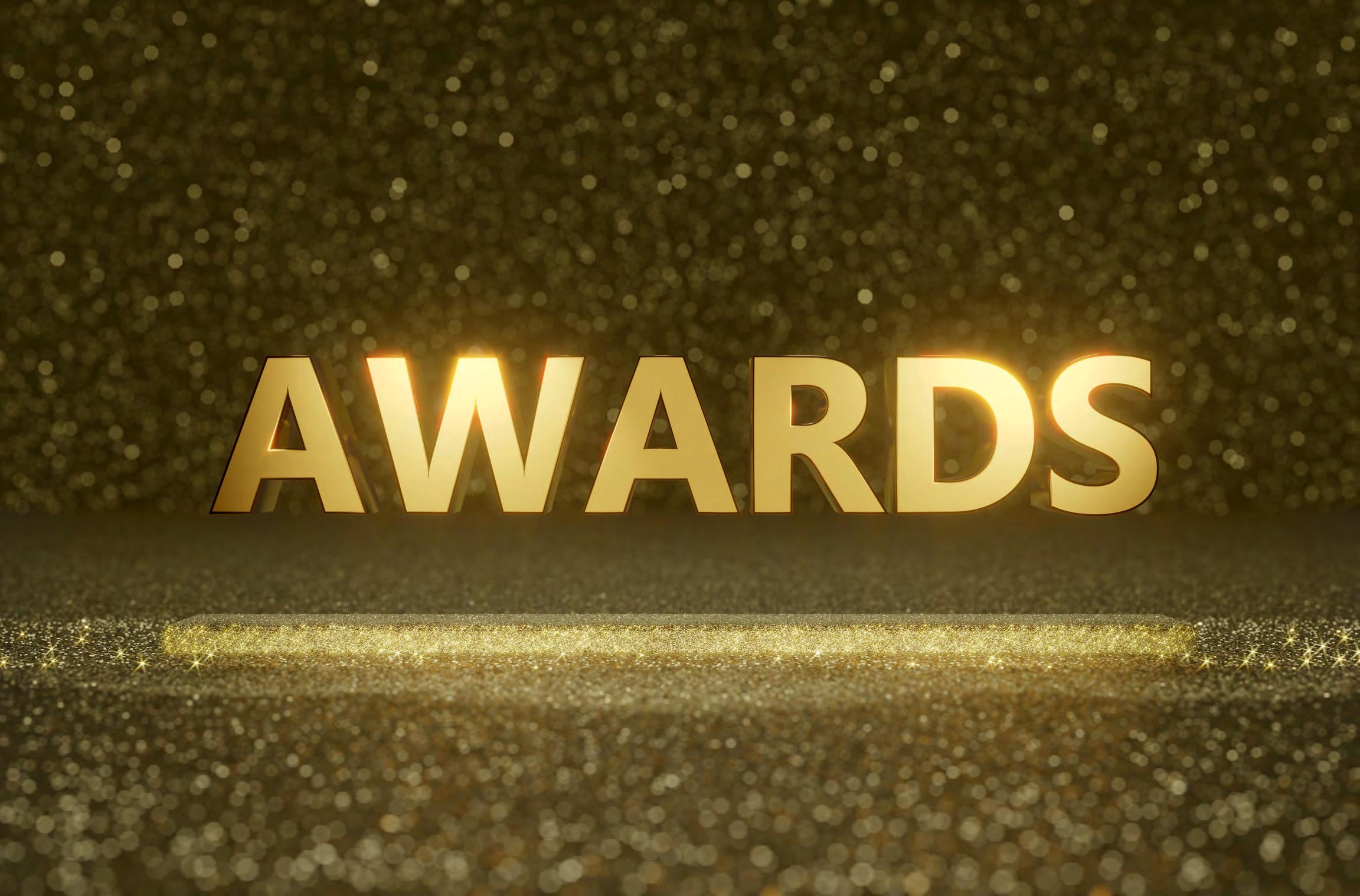









Consciousmaturedatingmeans knowingyourself,embracing genuineconnections,andvaluing thedepthofsharedexperiences

Ascendinghearts.com
OMTimesBookSpotlightserviceisaspecialized promotionaltooldesignedtohighlightandelevate bookswithinthespiritualandconsciousliving community.
ByleveragingOMTimes'extensivenetworkand platforms,authorsgainincreasedvisibilityand credibility,reachingatargeted,engagedaudience eagerformeaningful,transformativecontentinline withtheirinterests.









OMTimes Magazine is a Monthly PublicationfromOMTimesMedia,INC.
OMTimesMediaInc.isA502Company. AcompanyfullyOwnedby CathedraloftheSoul, a501-C(3), anIRSRegisteredCharity.
The Editor-in-Chief oversees a publication's content, guiding editorial vision, managing the team, and ensuring accuracy, quality, and adherence to ethical and stylistic standards.
Executive director of Art
An Executive Director of Art oversees the artistic direction of projects, managing creative teams, ensuring visual coherence, and aligning artistic output with organizational goals.
A magazine publisher manages the business side, overseeing production, distribution, marketing, and financial aspects, ensuring the magazine's profitability and alignment with market trends and audience interests.
An Executive Editor directs a publication's editorial strategy, supervises content creation, manages editorial staff, and collaborates with senior management to ensure quality and consistency.
OMTimes Social Media TV
Distribution And syndication
Excellence & Concierge Service
Tv & Radio Integration






IsEmpathyasuperpower?Ifso, howmayweembraceEmpathy asadailyhealingpracticeinour lives and relationships? Dr. Judith Orloff. Dr. Orloff is a psychiatrist, an empath, a New York Times bestselling author, and a UCLA clinical faculty member. Her books have included The Empath Survival Guide and Thriving as an empath. She synthesizes the pearlsofconventionalmedicine withcutting-edgeknowledgeof intuition,energy,andspirituality. Dr.Orloffspecializesintreating highly sensitive people in her private practice. She's been featured on The Today Show, CNN, Oprah Magazine, and the NewYorkTimes.

Victor Fuhrman: Congratulations on your brand-new book. The introduction was done by the Dalai Lama, his Holiness the Dalai Lama.Howdidthatmakeyoufeel?
Judith Orloff: It made me feel incredible, but theDalaiLamaprofoundlyfocusesonEmpathy and compassion. I think it was right up his alley because this is what he truly believes in, andIfeelsohonoredthathechosetowritethe forwardtothegeniusofEmpathy.
Victor Fuhrman: Let's start with what inspired thegeniusofEmpathy.
Judith Orloff: Well,whatinspiredthegeniusof Empathy?WhenIlookattheworld,anditisn't working, it's just falling into old traps of resentment, polarization, and hatred, and we need something else. Empathy has always beennearanddeartomyheartbecauseI'man empath, - but I wanted to devote a book on Empathy. How to reach it in a variety of situations and why we would want to do that because I present Empathy the genius of Empathy as a healing force and a healing energytotapinto,notjustassomethingniceto do, but when we tap into Empathy, we literally can change our biochemistry and the energy flowing in our bodies and our environment aroundus.
VictorFuhrman: Andweneedthatinourworld today. Absolutely. Let's begin with your early path. When did you first realize that you could feel the feelings of others? And how did this manifestforyou?


JudithOrloff: ThisfirstbeganwhenIwas a little girl, and I noticed that I could feel whatmymotherwasfeelingorfeelwhat strangerswerefeeling,orIwouldgointo a shopping mall or crowded place and feelwhateveryonetherewasfeelingand walkoutexhaustedoroverwhelmed.And I didn't realize I was an empath at that point. An empath is somebody who doesn't have the normal filters other people have. So, I take on the various emotions and energies of the world like an emotional sponge. And so, I had no toolsbackthentolearnhowtodealwith that.Andsoit'stakenmemanyyearsto developmanyoftheskillsItalkaboutin thebookthatcanteachpeoplehowtobe empathic and set healthy boundaries so you're not taking on all this energy that isn'tservingyou.
Victor Fuhrman: Absolutely. Can you remember or share with us some of the experiences when you started sensing and feeling things and what they were like?
Judith Orloff: It was my nature. I did it naturally, which was overwhelming because nobody else did it around me. My parents, both physicians, never mentioned these insights, intuitions, or whatever you're picking up again around myfriendsorotherpeople.Andso,Igrew upashamedofmyabilities,andIgotvery heavilyinvolvedwithdrugsinmyteenage yearstotryandsquashmyabilities.
AndthenIhadanear-deathexperience whereIwentoveracliffinacar,after which I survived miraculously. Afterward, my parents forced me to seeapsychiatristwhoturnedouttobe anangelinmylife,whotaughtmethat to be whole, I had to embrace my deepest Empathy, my intuitions, and myspiritualityintomybeing.Icouldn't keep running from them because it wouldn'twork.
Victor Fuhrman: Absolutely. You chose a career in medicine with psychiatryasyourspecialty.Whatrole hasanempathplayedinyourwork?
Judith Orloff: Central, it's the heart of mypracticebeinganempath.
I combine traditional medicine and everything I learned at UCLA, WadsworthVAHospital,theUniversity of Southern California, and the county hospital. I combine all that knowledge with Empathy, intuition, and energy medicine. And so, whenever I see patientsorgiveworkshops,Ilistenwith all those different ears. And it's a very natural thing to do for me. I've been doing it for over 25 years, so I've had lots of practice and many amazing experiences and success experiences integrating.Andsonow,inmybooks,I would like to present that integration asapossibilityforthereaders.

This book is for empaths and people who are simply interested in developing Empathy who aren't necessarily empaths. Still, it is for everyone who wants to find a form of healing in their own bodies and their own lives. That comes from the compassion and Empathy that we all have. It can change your life, enhance relationships, and improve the world.
HowdoyouincorporateEmpathyintoyour family? You know, how do you incorporate Empathy into your work? Where is it appropriate?
WhatdoesEmpathymean?Itdoesn'tmean you'reoncall24hoursadayforeveryonein need.ThatisnothealthyEmpathy.There'sa chapter on healthy Empathy and how to achieveitratherthanbeingamartyr.
It's important to learn how to set boundaries with Empathy. Give when you can, when you're tired, rest and say no, and balance self-care and giving to others.

Victor Fuhrman: Empathy, like charity, begins at home when you take care of yourself first, right?
JudithOrloff: Itdoes.Andthere's a chapter on self-empathy, and you think that would be the easiestthingtodo,justtobenice to ourselves, but it's really the hardestthingtodo.Now.I'vehad conversations with other therapistsovertheyears,saying, why is it so much easier to take care of our patients than it is ourselves? And it is just a common dilemma. And if you're experiencing this, don't feel ashamed or anything, but it's importanttobeabletoshiftthat and show Empathy for the experiences you go through in life. Life can have its ups, and it canhaveitsdowns,andyouwant to be self-empathic the whole ride. You don't want to give up your Empathy when things start to get rough because life combines many things. And if you're going through a physical oremotionalchallenge,yourselfempathywillbeyourbestfriend. You need it. The last thing you needtodoisbeatyourselfupas you'retryingtoheal.

Victor Fuhrman: Have colleagues ever asked you about your empathic abilities?
Judith Orloff: Oh, all the time, because I've written these books about them, and I train healthcare practitioners to incorporate Empathy and intuition into patient care. And so, I'm very candid about my abilities for those who want to learn how to also do it and combine those aspects of themselves. Now, it is very important. And for, let's say, physicians who don't believe in any of this, and there many, um, I could still be friends with them. It's not a deal breaker. Um, absolutely. It's, um, it's a difference. If they're happy not doing this, I'm happy for them. I just know that many people are attracted to developing these aspects of themselves to be more whole, but that doesn't mean everybody.

Everyone is; it's not for you if you don't want it. You have to be attracted to it to develop it, and then it will be a beautiful right path for you for an entire lifetime.
Victor Fuhrman: You've touched upon some of these elements for those who may be unsure. What is an empath, and what are some of its traits and abilities?
Judith Orloff: An empath is somebody who doesn't have the regular filters other people have. So we feel everything. We feel what's going on with strangers. We think about what's happening to people suffering in different countries.

We feel what's going on with family members, but so much so that it can overtake us and deplete us. So, we go on sensory overload. And so, empathize with their positive traits, our intuition, connecting to nature, love, and service, helping the earth, listening to music, giving to others, helping to be helpers, and just loving. They're not really into loud noises or big events. Empaths would rather want to have one-to-one meetings or just small meetings that are quiet rather than, let's say, going to a Madonna concert as one of my extroverted friends just went to and loved it, and empaths can be introverted.

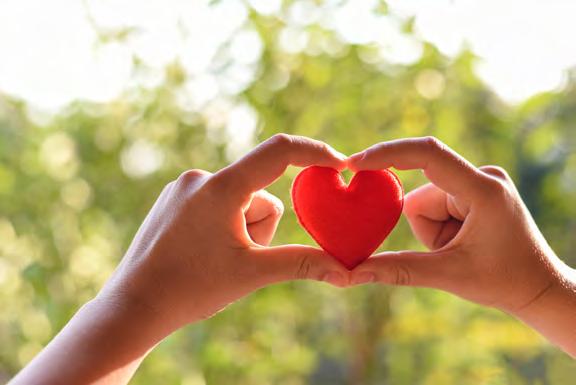
They can be ambiverts, which is in the middlebetweenintrovertsandextroverts, or they can be extroverts. So, I am an introvert and an empath, but Empathy is different. But even extroverted empaths need to recoup their energy and decompress after they're around many people.It'sveryimportant;otherwise,they willgoonoverload.
Victor Fuhrman: Now, you touched upon someofthebiologicalaspectsofthis.Is there a scientific explanation for being anempath?
Judith Orloff: Yes. And there's a psychological and - neuroscience explanation for Empathy, not just being an empath, but you can look at empaths as being the highest on the empathy spectrum. They're able to sense and know and pick up things, I think, more than other people. However, midline, midpoint, and Empathy have many interesting neuroscience explanations on the mid-midpoint of the empathy spectrum.
There's something called the Mother Teresa Effect, which just fascinates me, where it's been proven that if you witness an act of Empathy, somebody's being empathic on the street, let's say, and researchers were to measure your blood at that point, your immunity would have gone up, your stress hormones would've gone down, and all kinds of good things
would be circulating in your blood asaresultofsimplywitnessingthe actofEmpathy.
And I want you to really think about that.Thatisreallypowerful.Theactof Empathy is healing not only for the personexperiencingitbutalsoforthe observer, who, I mean, is really powerful. I was in the gym the other day, and a woman was there with her husband,who'dlosttheuseofhislegs. He was on one of the machines working out his arms, and she just lovingly put her arms around him, and gently,itlookedliketheyweremaking love.Shegentlyliftedhimandputhim inhischairintheslowest,mostloving way. And I felt so much love coming from that, and it just rushed through mysystem,asdidafarawayobserver. Andso,Ijustwantpeopletoknowthat the genius of Empathy is about developing something really powerful inyourself.
It'sthepoweroflove.It'sthepowerof the heart. And you can feel it's energetically uplifting and healing in the body to witness such things. Therefore, we must create acts like thatintheworldsootherscanwitness themsowecanexperiencethehealing of it. And the recipient, by all means, willfeelthehealingofit.
So, the neuroscience of Empathy and being an empath involves the Mino Nervous System in the brain, the compassionneurons.
And it's not that with an empath, the compassion neurons are on overdrive, going much faster than with ordinary Empathy, which is ordinary, exceptionally ordinary, wonderful, and amazing. But it's having the compassion neurons on overdrive so you feel more compassionforeverybody,whichcan sometimesdepleteyou.
So,thetrickofEmpathyandbeingan empath is learning how to find balance in your life. It's learning how to give and appreciate the Empathy showntoyouandothersintheworld. Instead of just going on to the next thing, let yourself feel it as if healing energycomesfromit.AndIknowI've experienced it so many times with you. You're so empathic. Just being aroundyouandtheloveinyourheart can make my energy rise and be more heart-centered. And we can do thisforeachother.Wecandothisfor our friends, family, and strangers, evenbyemanatingEmpathyinaline, let'ssay,inamarket.
Victor Fuhrman: Obviously, for those who haven't learned to train this gift, there are both blessings and curses, aren'tthere?
Judith Orloff: Well, the biggest curse, or so-called curse, is that you just get so exhausted all the time from being empathic.Andit'sverypainfultogoon empathyoverload.
It'sextremelypainful.Andso,youwant toavoiditatallcosts.Whenpeopleare developingtheirEmpathy,theyneedto learnhowtosetlimitswithitandhow toregroup,comebackandhavesome alone time and meditation time, and reallycomebacktothemselvesrather than interacting with people because otherwise, you'll get burned out. And thatcouldbealongprocessofillness and depression or anxiety, panic, or fibromyalgia.
Thebodycanturnagainstyouifyou're overloadedallthetime.Youdon'twant todothattothebody.Andsothat'sthe challenge. I think it is a better word thancursed.
Victor Fuhrman: Now, some people are labeled as highly sensitive people. Isthereadifferencebetweenbeingan empath and being a highly sensitive person?
JudithOrloff: Ahighlysensitiveperson is a little bit down lower on the spectrum in the sense that they don't usually have the issue of being an emotionalspongeandabsorbingother people's energy, but they are very sensitive to sensory inputs such as lightsmells,sounds,crowds,,anykind of sensory input that's intense, they could get over overloaded from. So that's just one step down on the spectrumofEmpathy.

Andthenbelowthatare people with everyday Empathy, which is gorgeous.Inthebook,I talk about the various types of everyday Empathy. You could havecognitiveEmpathy, for instance. Some people have Empathy with their minds, and that'salltheywanttogo wheretheywanttogo.
They don't want anything else. They're comfortable with that. And that's fine if they don't want to go further than that. Any kind of Empathy I honor. And then there's emotional Empathy, where you can actually feel somebody else'semotions.
Ialsoteachyouhow toavoidtakingthose oninthebook.There's intuitiveEmpathy,or youmightrelateto peopleintuitivelyand getflashesabout them.Images, impressions,sight, smells,sounds, knowing.Youmight relatetopeoplethat way,butjustasa warning,it'simportant toavoidintuition, whichis overwhelmingwhen you'regettingtoo muchinformationtoo fast.
Then there's spiritual Empathy, where some people's default form of Empathy relates to people spiritually and sees the goodness in others. They see what people can do to help themselves and the world,andtheycanseethe white light above their heads. And so, no matter what your default is for yourempathytype,youcan learn to develop it, or you can learn to test the other empathytypes.
Victor Fuhrman: Dr. Orloff, many people have been told you are too emotional or too sensitive, and they growupfeelinglikethere's something wrong with them. Is it your experience that many of these people areactuallyempaths?
JudithOrloff: Oh,yes.That's typical of being an empath, where people are told that they're just too emotional andsomethingiswrongwith them.Thatthere'ssomething that needs to toughen up or change.Anditcanbeavery shamingmessage.Thatwas themessageIgotasachild.
It's not true. You are not overly sensitive; you're beautifully sensitive, exquisitely sensitive. However,youmayneedtolearn how to set boundaries and limits and have a better radar for positive people rather than getting involved with narcissists, sociopaths, or psychopaths.Yoursensitivityis agift.
VictorFuhrman:There'sanold cliche that women are more sensitive than men. Does gender play a role in being an empath?
Judith Orloff: I think gender does play a role in that. Both men and women are `5t6rrrr+empathic and intuitive, I just want to say that. But culturally, particularlyintheWest,menare given a really hard time about being sensitive and being a crybabyandbeingawhiner,and being a mama's boy, and not wanting to go to football games,butratherwantingtogo forawalkinthewoodstowrite poetry.

So, men have had a horrible time with it growing up in Western culture, and not that women have haditperfectly,butwomen,women are emotional, they're considered emotional, and emotional men are not really considered strong. Hopefully, all that will change. I'm doing my best to help untrue stereotypes change, but they're still inexistence.AndIhaveaFacebook group with about 22,000 empaths, and most of the sharing happens with women. And occasionally, a womanwouldsay,whereareallthe men? Then suddenly, a bunch of them would appear and say, "We're here, we're listening. I just have neverfeltcomfortablesharingabout my sensitivities because I've been madefunoforcalledacrybaby,and they stick around for a while, and thentheykindofrecedeagain.And it'smainlythewomensharing.

Victor Fuhrman: What are some of the challenges that empaths may face in their personalrelationships?
JudithOrloff: Ah,personalrelationships.
Well, there's a chapter on relationships in the genius of Empathy. Men can face challenges such as not listening in a particular way to a woman when she shares her emotions. Sometimes, men can be considered overly rational or wantingtocomeinandsolvethesituation too quickly, you know, rather than being empathic with what the partner is going through,saying,Iseeyou'regoingthrough a lot, just something minimal even. However, a mistake many men make is coming into, or linear, people make. They come in and want to solve the problem too quickly. And that doesn't feel good coming from, let's say, I'm the person sharing something. I need to be listened to.Idon'tneedtobetoldwhattodointhe firstfivesecondsofmysharing.

It feels very abrupt to do that. And, um, and soit'simportantwhenyou'reinanempathic relationship that you want to listen to each other.Youwanttolistentowhateachother says. You don't want to talk to each other. You want to leave each other with a manageable number of questions or more subjects brought up at a time. That's a mistake that many people make; they begin byexpressingonething.
Victor Fuhrman: Dr. Orloff, what is emotionalcontagion,andhowdoesit impacttheempathicperson?
Judith Orloff: Emotional contagion is when emotions get spread from one person to another, usually in a workplaceoragatheringofpeople.For instance,ifsomebodycomesintowork and says, "Oh my God, I'm going to lose my job, " that panic will spread over the whole workplace. Everyone will think, oh, am I going to lose my job? It is just like a panic energy that's spread, as opposed to, I'm so happy to see everyone today. Then you have positive emotional contagion where you go, that's nice. And everybody feels a little bit more uplifted. And so, emotions have energy. Empaths feel the emotional implications the most. Somebody with emotional Empathy as their primary style might feel it very strongly. You want the communication to be calm, as calm as possible, and loving instead of panic, mean, or abrupt. You can spread gratitude, you can spread Empathy, you can spread understanding, or you can spread panic,fear,anddoubt.
Victor Fuhrman: In the genius of Empathy, you refer to it as a superpower.Howso?
Judith Orloff: Empathy is a superpower because it can heal you, transform relationships that weren't workingatallbefore,andmakethem
at least compatible, let alone loving. Empathy can help heal you physically and emotionally in terms of your relationships, and it can help heal the world as well. For instance, if many of my patients feel powerless listening to the news, they get so drained from it andwanttohelptheworld,butthey don'tknowhow.AndI'mtellingyou, ifyousitbyyoursacredspace,orif you don't have one, just, you know, a place just to have a candle and some incense where you can sit quietly and do a meditation and focus on your heart energy and put your hand on your heart and feel that warmth generated there, and send your prayers of Empathy and love to those who need it in the world, that energy will go -exactly where it's needed, and it will find that person who's lost, or that personwhoisjustabouttogiveup, and it will suddenly bring a bright lighttothemandliftthemup.
Victor Fuhrman: What would you like your readers to take away fromthegeniusofEmpathy?


JudithOrloff: Iwouldlikethereaderstotakeawayhope,thathopeforabetter self, better health, better emotions, a better future, better relationships, uh, time out and also connection, a deeper connection to quell the loneliness that may happenin,inoursocietyandaroundtheworld.Tofeelaconnectiontoyourself, to spirit, to others, and feel the unity of those who value Empathy and love. I knowthesevalues,Ibelieveinthem,Iknowtheywork,andIknowtheycanuplift younomatterwhat'shappening.So,Ihopeyougetawaywiththatknowingas well.




Health and Healing encompass practices and knowledge focused on maintaining, restoring, and enhancing physical and mental well-being through various therapeutic and holistic approaches.

Ten Tips for Nurturing Body, Mind, and Soul
By OMTimesIn the hustle and bustle of our daily lives, it's too easy to get caught up in the whirlwind of activities and responsibilities.
We often prioritize everything
and everyone else, neglecting the crucial task of self-care. Remember, our energy frequencies are not just abstract concepts; they have a tangible impact on our ability
to heal and rejuvenate ourselves. When our thoughts are constantly burdened, our bodies receive those distress signals, potentially leading to depression or physical ailments. Adopting methods to lift us from our anxieties and life's challenges is essential. We can nurture ourselves and love ourselves. We can accept our wonderful selves, with all our faults, foibles, strong points, weak points, feelings, thoughts, and everything else. It's the best thing we've got going for us. It's who we are, and who we were meant to be. And it's not a mistake. We are the greatest thing that will ever happen to us. Believe it. It makes life much easier.
Melody BeattieMindful Meditation: Meditation is more than just sitting silently. It's about being present and allowing your thoughts to flow without judgment. Regular meditation helps reduce stress levels, improve focus, and foster a sense of peace.
Nature Therapy: Never underestimate the power of nature. A simple walk in the park, gardening, or even sitting by a window with a view

of greenery can significantly uplift your mood. Nature has a unique way of healing and recharging our spirits.
Physical Activity: Exercise isn't just for physical fitness; it's a fantastic mood booster. Activities like yoga, dancing, or even a brisk walk can increase endorphin levels, improving your mood and reducing feelings of stress.
Healthy Eating: What we eat significantly affects how we feel. They say we are what we eat, and

Foods rich in vitamins, minerals, and antioxidants can boost mood and energy levels. Don't forget to hydrate – water is essential for every cell in your body.
Digital Detox: In a world where we are constantly connected, taking a break from screens can do wonders for your mental health. Allocate certain times of the day to unplug from phones, computers, and TVs.
Creative Outlets: Engaging in creative activities such as painting,
writing, or playing a musical instrument can be therapeutic. It allows a form of expression that can be both healing and uplifting.
Quality Sleep: Never compromise on your sleep. Good sleep hygiene is critical for mental and physical well-being. Ensure you get enough rest and maintain a consistent sleep schedule.
Social Connections: While having time to yourself is important, meaningful connections with friends and family are vital for

emotional support. Whether it's a heart-to-heart conversation or a fun outing, these interactions can greatly rejuvenate.
Gratitude Practice: Keeping a gratitude journal or simply reflecting on things you are thankful for can shift your focus from negative to positive, fostering a sense of contentment and happiness.
Professional Help: Sometimes, the best way to deal with overwhelming emotions and stress is to seek professional help. Therapists can
provide strategies and support tailored to your needs.
Remember, these methods are not one-size-fits-all. It's about finding what resonates with you and incorporating these practices into your daily life. By nourishing your body, mind, and soul, you're not just surviving but thriving.
So, the next time you feel overwhelmed, step back, breathe, and choose to invest in yourself. Your well-being is the most valuable asset you have.



Physical injuries not only affect the body but can also profoundly impact our spiritual well-being.
Experiencing physical trauma can lead to spiritual distress, an anguish that affects the very core of our being. This article explores the emotional
aftermath of spiritual trauma caused by physical injury and offers healing examples to repair the damage to the psyche and spirit.
When we face a physical injury, the associated emotional trauma can stem from various factors:
1. Loss of Identity: Physical injuries may result in the loss of abilities or a change in appearance, leading to a loss of identity or a sense of self. This can trigger emotional struggles such as confusion, low self-esteem, and a disconnect from one's values and beliefs.
2. Fear and Anxiety: The traumatic event itself, or the fear of experiencing it again, can create deep-rooted emotions of dread, anxiety, and hypervigilance. These emotional scars may interfere with one's ability to trust oneself and others, hindering spiritual growth and connection.
3. Loss of Control: Physical injuries often come with losing control over our bodies. This loss can evoke feelings of powerlessness, frustration, and helplessness, resulting in spiritual trauma and
a sense of disconnection from one's spiritual beliefs or practices.
Recovering from spiritual trauma caused by physical injury requires a holistic approach that addresses both the emotional and spiritual aspects of healing. Here are some examples of healing practices that can assist in restoring the psyche and revitalizing the spirit:
1. Seek Professional Support:
Engaging with a therapist or counselor experienced in trauma recovery can provide a safe space to explore and process emotions related to the physical injury. Therapeutic techniques such as cognitive-behavioral therapy or eye movement desensitization and reprocessing (EMDR) can help release emotional trauma and restore a sense of balance.
2. Expressive Arts Therapy:
Engaging in creative outlets like art, music, dance, or writing can assist in expressing and releasing emotions that may be difficult to articulate verbally. These therapies

can provide catharsis, promote self-expression, and foster a deeper connection with oneself.
3. Mindfulness and Meditation: Cultivating a regular mindfulness or meditation practice can help in grounding oneself, reducing anxiety, and rebuilding a sense of inner peace. Mindfulness movement practices like yoga or tai chi can enhance body awareness and promote healing.
4. Connecting with Community: Isolation often accompanies spiritual trauma caused by physical
injury. Seek support from others who have experienced similar challenges through support groups or online communities. Sharing experiences, empathizing, and offering mutual support can be instrumental in the healing process.
5. Reconnecting with Purpose: Rebuilding a sense of purpose is crucial for recovering from spiritual trauma. Engage in activities or volunteer work aligned with personal values and beliefs to rediscover a sense of meaning, boosting self-esteem and igniting the spirit.

Recovering from spiritual trauma caused by physical injury is a transformative journey that requires self-compassion, patience, and perseverance. These qualities can foster inner healing, resilience, and a deeper connection with oneself when faced with such a challenge.
1. Self-Compassion: Self-compassion involves treating oneself with kindness, understanding, and care in moments of difficulty or suffering. In the context of spiritual
trauma due to physical injury, selfcompassion allows the individual to acknowledge and validate their emotions, pain and struggles without judgment. By showing kindness to themselves, they can create a safe space to heal and restore their spiritual well-being.
For example, imagine a person who sustains a severe injury that prevents them from engaging in their favorite physical activities, which are a significant source of their spiritual connection and joy. In practicing self-compassion, they would acknowledge their feelings of

loss, frustration, and sadness caused by the injury. Instead of criticizing themselves for their inability to participate in those activities, they offer themselves understanding and support, allowing the healing process to begin.
2. Patience: Patience maintains a calm and accepting attitude when facing difficulties and setbacks. It involves understanding that healing takes time and allowing oneself to progress at their own pace. In the context of spiritual trauma, patience enables the individual to accept their present circumstances while holding a vision of their eventual recovery.
Consider an individual who experiences a physical injury that limits mobility and independence in this example. In cultivating patience, they accept that their recovery will require time and effort. Instead of becoming frustrated or discouraged by slow progress, they practice patience by focusing on small milestones, celebrating each step forward, and allowing themselves to heal at a pace that aligns with their body's needs.
3. Perseverance: Perseverance refers to the ability to continue working towards a goal despite obstacles, setbacks, or difficulties.
In the context of spiritual trauma resulting from a physical injury, perseverance allows the individual to maintain hope, resilience, and determination in their recovery journey. It involves staying committed to their healing process despite challenges along the way. For example, imagine a person who undergoes a challenging surgery and faces a long and arduous rehabilitation process. Through perseverance, they maintain a positive mindset and continue working diligently on their recovery exercises, even when progress seems slow or setbacks occur. They persistently engage in self-care practices, seek support, and remain oriented toward restoring their spiritual well-being.
By cultivating self-compassion, patience, and perseverance, individuals recovering from spiritual trauma due to physical injury can foster a sense of inner strength, resilience, and growth. These qualities create a foundation for healing, allowing them to navigate the challenges of their recovery journey while maintaining their spiritual well-being.

By acknowledging and addressing the emotional scars left behind, individuals can rebuild their psyche, strengthen their spirit, and find new paths toward resilience and inner healing. Remember, healing takes time, and it is essential to seek professional guidance and support throughout the process.
About the Author:
Andrew Pacholyk is a licensed acupuncturist, board-certified herbalist, and master healer with over 20 years of experience in alternative medicine.
Spirituality involves exploring one's inner self, seeking deeper meanings, connecting with the transcendent, and understanding life's purpose through various philosophical, religious, and personal beliefs.





I'm probably not supposed to admit this (being a spiritual teacher and all), but one of my biggest pet peeves is when people feign being spiritual. I'm sure you've met them. They have the vernacular memorized cliches perfected, all delivered with a woo-woo-esq, wiseappearing Mona Lisa smile.
These pretenses have become so ingrained that they may not even realize they're faking.
How do I know? I have done that there, especially at the beginning of my spiritual journey. In other words, my attitude comes from experiencing both sides.
Most actors know that eventually, the curtain goes down, and the show is over. They scrub off their makeup and return to their ordinary existence. But what if that actor has been starring in this play so long that they've forgotten they are acting? Even though the applause has ceased, the audience has left the theater and no longer receives a paycheck. They don't recall that they're playing a role.
After helping thousands get in touch with their authentic selves by discovering the subconscious origins of numerous types of acts, I've observed one common denominator: The universe does something dramatic to help bust their façade. A traumatic event of some kind, someone calling them out on their phoniness; enough people expressing disdain from their Pollyanna-ish retorts. Or they might just realize that not being real is more painful than keeping up a well-polished front. In my experience, it's almost impossible to keep up a Joe Spiritual act when up against what life presents: People see it even if we believe we've fooled them. Who do they think they are kidding, anyway?
Truth is, every one of us is on a spiritual journey. An important part of that process is removing the masks we've taken on to evolve into our truest selves. However, with so many teachings offering techniques to disguise our humanness, 'act as if' and 'fake it until we make it,' that journey ends up being an enlightenedsounding method to avoid being real.
Here are a few ways Joe Spiritual shows up:
Joe Spiritual is proficient at affecting positivity, even in situations that most humans would define as sad or hopeless. They sugarcoat negative events systematically, encouraging others to 'look at the bright side' even in tragic situations. You tell them your best friend was murdered, and their upbeat response is, "Well, at least they went quickly."
'It's all good' is their motto, pretending they are just fine no matter what's going on in their lives. They use spirituality to deny their humanness, their emotions, and the natural pain they feel when experiencing loss. No matter how evolved one is,

a truly spiritual person allows feeling emotions without judgment until they run their course. Then, and only then, they choose to look at situations from a spiritual perspective to discover how it was all good
Joe Spirituals espouse letting go of the past, loudly insisting that we 'be here now.' They call people out when sharing painful stories, admonishing them to just move on. That's all well and good, but forcing oneself to deny the past is one more way to suppress pain rather than understand, resolve, and release it. Besides, just being
heard compassionately, without judgment, might be all they need to get past their pain.
This philosophy can include avoiding planning, going with the flow, and trusting the process. Spontaneity sounds nice, but most of life does need at least some planning. Not finding a vacant hotel room while on vacation, not saving enough money for retirement, having a cell phone die mid-business call, not being prepared for the winter snow living in the mountains (ahem) – certainly not fun.
Evenly balancing planning and trusting sure works better.

The current catch phrase in spiritual circles is: 'Just believe and you will manifest.' Yes, there is a powerful energy in our thoughts. However, emphasizing this can make people feel inept at not having good enough thoughts or being incompetent at harnessing them. It takes much more than training thoughts to manifest one's heart's desire. It takes discovering those pesky, programmed negative beliefs, especially hidden deservingness issues, and releasing them from the source. Otherwise, they are just suppressed. Listening to, trusting, and
taking action from an intuitive place is also part of the manifestation process.
When coming from an authentic place, all of these ways of being are lofty goals to attain along a spiritual path. However, Joe Spirituals uses them as denial and avoidance tactics. Not only does that not work, but it can cause physical problems, emotional reactiveness, and a permanently embedded mask.
True spirituality is not always easy; it involves digging deeply and confronting fears, insecurities, false

beliefs, societal expectations, and karmic patterns. A spiritual person is willing to confront their denial (AKA shadows), knowing that getting there will allow a truthfilled life.
Spirituality is also about knowing this life was chosen, recognizing these choices, and learning lessons about higher consciousness from them. They know that this life is about cleaning up and balancing out anything they have done in the past, both in this and previous lifetimes.
A spiritual path is not about comparing journeys or finding the 'right' way to evolve. It's about honoring our unique path and respecting the diversity in others' spiritual experiences. It's knowing that, although we might be taking different routes, we are all getting to the top of the mountain. Eventually.
How can we know if someone's spirituality is genuine or just another way to impress people, get attention, validation, control, and avoidance?

As one who supports students' spiritual journeys and has been on my own inner discovery process for decades, I've become skilled at telling the difference. Granted, these subjective perceptions are not etched in stone, but there is truth in all of them.
As you read through ways to discern the difference between genuine spirituality and an ego trip, look inside to see if there might be a bit of a Joe (or Josephine) Spiritual running your show. Notice any judgmental thoughts – they are clues to look at a mirror!
True spirituality produces a natural sense of humility. There's an acceptance that we are a tiny part of a boundless universe yet feel an inseparable connection with everyone and everything. There is a knowing that we are all the same, manifesting in unique ways, learning individual lessons in these bodies, and teaching others in ways we may not be aware of.
Using spirituality to exclude, judge, or belittle others misses the point of conscious evolution. A spiritual

person knows there are many paths to enlightenment and respects all of them, never asserting superiority over any. They would never stand on a pedestal proclaiming I'm so much more evolved than you.
This journey shows that there is always more to learn and endless experiences to grow from. Authenticity admits to not having all the answers, knowing that there is truth and value in all teachings.
There is trust based on experience that everything that happens was chosen to assist in personal as well as planetary evolution. It may take time to see the Bigger Picture, but it all makes sense in retrospect.
True spiritual people react to criticism and challenging events with grace, even gratitude for the opportunity to reflect deeper within. If they find

themselves getting defensive, taking something personally, feeling judged, insulted, or invalidated, they recognize that their primitive consciousness (fight, flight, freeze) has been triggered. They have learned to stop, look within, and see what their reaction is really about rather than obeying the demands of their triggers.
No matter how much they resist, they know that when a button is
pushed, they are being presented with a way to look within to discover a mirror. They willingly acknowledge their denial and see what it's about. Even if it takes a while.
Although many New Age philosophies equate spirituality with power to manifest desires, a truly spiritual person knows that material possessions do not create happiness or

fulfillment. Not to say that spirituality means living a meager existence, but they know that they can own but not be attached to material things.
Those who are genuinely spiritual don't crave external validation, recognition, or approval from others. They feel content within themselves and don't share their spiritual experiences, hoping for praise or reassurance. They know their spirituality is a personal journey, not a performance for others or an
achievement to show off. They know it is enough to just be an example.
A key aspect of authentic spirituality is a consistent feeling of gratitude, appreciating the simple joys of life, and acknowledging their blessings as well as their challenges. However, they don't use feeling grateful to bypass other emotions. They can look back at their life story and understand why things happened in the way they did. Then, gratitude becomes a natural byproduct.
Spirituality and ego are often seen as opposites, yet they coexist as partners within this human form. The ego can help define our individuality and navigate the world if used in a pure way. But when it dominates our thoughts and actions, it causes problems in our spiritual journey, getting in the way of sincere compassion and connection.
By observing the ego without judgment, we can experience a shared humanity rather than elevating ourselves above others.
Being aware of these signs doesn't give permission to police others' spirituality or give one more way to feed that needy ego. Keep in mind that there are no spiritual exams to pass and no boxes to fit inside this deeply personal journey.
Instead, let this understanding further develop compassion, empathy, and tolerance in your interactions with others. After all,
each of us is on our own twisting path with myriad lessons to learn (and teach) as we connect with our higher self, reveal and live our purpose, and unfold to inner peace that transcends this physical reality.
Growing secure in our own spirituality allows us to become better at discerning where someone's spirituality is coming from— authenticity or ego. Plus, it will enable us to see beyond their (our) Joe Spiritual act and connect with their (our) deeper spiritual essence.
And that is what we all truly deserve.
Royce Morales is the founder of Perfect Life Awakening, a spiritually based, lifetransforming series of classes and private inner-inquiry work that takes you from triggered to empowered. Royce is the author of three books about her teachings, all available on Amazon. If you feel ready to break through false, fear-based programming to experience authentic self-acceptance, reach out at Royce@RoyceMorales.com

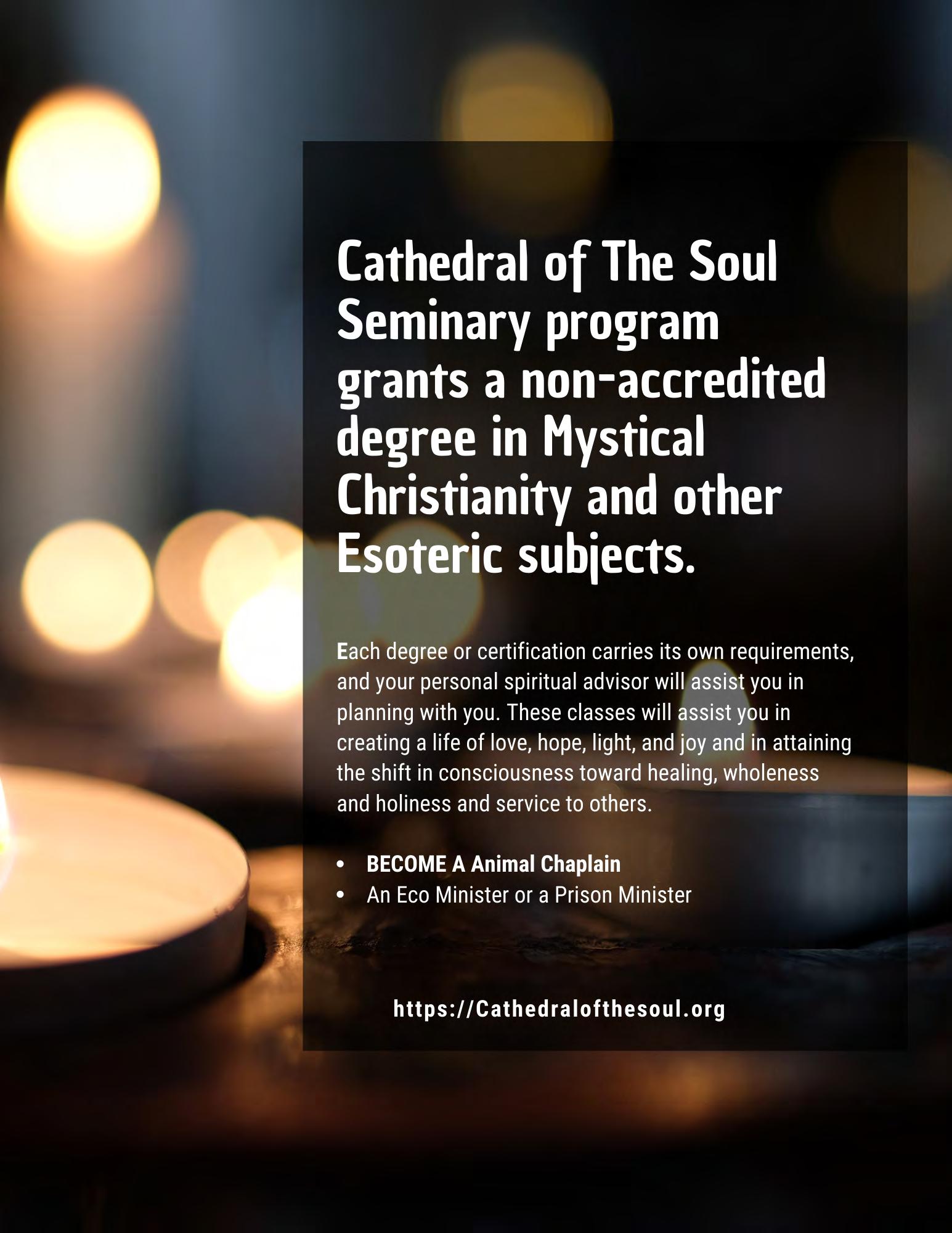

Discover how meditation can enhance your mediumship abilities. Clear your mind, elevate your vibration, and connect with beings of light. Every medium must clear its mind to communicate with beings of light,
making it serene and elevating its vibration. Meditation assists in this process.
Imagine a mind filled with thoughts, feelings, and emotions.
How could one discern whether what's inside is a mere thought, a message, or contact with a spirit?

Since meditation aids in clearing the mind, it becomes easier for the medium to comprehend what's transpiring.
If you're aiming to prepare yourself to reach a state of mediumship, know that, alongside prayer, meditation is an excellent tool. It helps you achieve the necessary conditions to initiate contact with higher beings or a spiritual mentor.
Given the vast amount of external information we receive daily, our thoughts can become disorganized, making logical reasoning challenging and concentration hard to achieve. Moreover, all humans face various problems and concerns, making them susceptible to a whirlwind of negative emotions that might arise from self-imposed pressures. Past memories, lingering resentments, fears, and anxieties affect our minds. This plethora of thoughts prevents us from connecting with our inner selves.

However, this can be reversed. Meditation allows us to return to our present moment and our core. It helps us momentarily forget our problems, letting negative thoughts "speak to themselves." This detachment from external factors enables contemplation of our inner world, inner voice, and divine spark, which sees and knows all.
Only when we access this central point, believed by scholars to be our heart, can we connect with divine love and expand it throughout the universe.
Meditation is a deeply personal way to connect with one's inner self. It fosters a mental openness to the divine and invokes guidance from a higher power. Remember, the universe reciprocates the energy we emit. Positive energies attract positive energy.
Thus, meditation is crucial for mediums aiming for a higher frequency.
Meditation implies clearing your mind of all thoughts. To achieve this, one must halt one's thoughts and train one's mind to operate powerfully and consciously, leading to more peace, calm, and depth.
As meditation silences voices, incorporating it into daily habits enhances mediumship development.
To begin meditating, focus your mind on a single object. This could be your breath, a mantra, a picture of a spiritual master, a saint statue, or even a fixed point on the ground.
Relax: Understand that relaxation is our natural state. Daily routines often lead us to the opposite: alertness, tension, anxiety, and stress.
Sit Comfortably: Ensure meditation isn't a chore. Opt for a comfortable sitting position with a straight back.
Close Your Eyes: Take deep breaths, feeling every part of your body as you focus on the air
entering and leaving your lungs. Maintain this for at least five minutes. Soft, relaxing music can also be helpful.
Avoid Auto-Pilot Mode: Your thoughts might try to distract you. Don't engage with them. Focus on your breath and let it pass.
Increase Duration Gradually: Try to meditate for longer periods with daily practice. This will improve your concentration, disposition, and emotional management.
Sitting Position: Starting your meditation while seated is recommended to avoid falling asleep. However, if you suffer from insomnia and meditation induces sleep, consider meditating while lying down.
Persist: While meditation is simple, it might not be easy initially. It's essential to persist and gradually make the practice more effortless.
Remember, the journey of meditation and mediumship is deeply personal. Trust the process, and you'll find the answers and clarity you seek.



Conscious Living focuses on mindfulness and awareness in daily life, emphasizing sustainable practices, ethical choices, personal growth, and a harmonious balance with the environment.




It’s one thing to hire a professional organizer and something else entirely to have an organizer show up at your door, like the interventions we see on the Hoarders TV Show.
Suppose a person is willing to get professional guidance and dutifully
follow the recommendations. In that case, that is half the battle and it can set the stage for a happy outcome, with the person making a complete turn-around in their life.
But what happens when a person resists the help of a professional organizer, almost in direct proportion

to how much they need their services? With this question in mind, I then began an on-line search for articles by Professional Organizers, to see if anyone had written about how they work (or decline to work with) hardcore clutterers, who do not want to change or follow any directives. How do they handle difficult or resistant clients?
So far, I have not seen any magic pills revealed, but I did find one article about how a Professional Organizer might benefit from learning how
to patiently, and compassionately, work with people who have mental health challenges. Bingo. This validates something that I had been thinking about, since it does seem like those with extreme clutter are usually plagued with mental health problems as well. In other words, the clutter and procrastination do not exist in a void. If the mental health aspect is not addressed, then how can long-lasting progress be made?
Many mental health issues are so stigmatized, that a person who needs

help may still remain in denial or inaction out of fear of being ridiculed. This is totally obvious when it comes to the people who are featured as extreme hoarding case studies. But what about the people who can hide their clutter, with friends and coworkers unaware of how serious it is?
Clutter is just a very embarrassing and visual display of the mental health issue, often rooted in depression, P.T.S.D., anxiety or Obsessive Compulsive Disorder to name a few diagnoses.
Does this mean that Professional Organizers need to become social workers as well? Do they need to study psychology? Well, the answer might be “yes” for certain people, if the organizer wants to take on that kind of troubled client to begin with. Decades ago, I was in a business networking group and got to know a professional Life Coach who made a point of saying she was not a therapist. She only worked with people who were motivated and positive about coaching. In my own Feng Shui practice, I have had to

turn away only a small handful of clients. In the half dozen cases, it was usually when a disturbed person was just over-the top disrespectful. In a few other instances, the client would challenge me relentlessly, comparing my recommendations to the conflicting advice they got from the internet. In those cases, I just could not work harmoniously with someone who did not have a base level of trust in me.
In the area of serious mental illness, there is a word used for those who
lack insight into their illness called “anosognosia.” This lack of insight is not just an obstinate refusal to cooperate. It is actually part of the illness, one of the symptoms. For example, about half the people with schizophrenia are unaware they are even ill. In fact, it is amazing and a real testimony to family bonds when a person who does not think they are ill will agree to take prescription medication (often with unpleasant side effects), just to please a loved one who cares about their welfare.

To be clear: I am not accusing “messy” people of being mentally ill. In fact, there are some people who are so busy in their business being successful that they don’t make time to tidy up or put things away on a regular basis. Hoarding is a completely different animal and the clutter itself can keep a person from being successful, with the constant nagging piles of “stuff” almost consuming the person. All the clutter is like the rock that Sisyphus has to roll uphill for eternity.
Just short of agreeing to get therapy, for anyone reading this article with serious clutter problems and procrastination: please hear me out. Perhaps you can recognize the cause of your biggest hurdles and you can approach those issues nutritionally, if not pharmaceutically. For example: if depression is your biggest obstacle in getting motivated to declutter, perhaps you can first attempt to clean up your diet and avoid all foods which exacerbate a mood disorder. Further, there are a number of natural super-

foods and nutrients you could try, before even considering actual antidepressant medication.
Search the internet for nutritional or herbal remedies for depression or anxiety, such as Ashwagandha. A regimen of natural cures could be just enough to help you get over the slump, which has been undermining your motivation.
What if you are not really depressed or anxious? What if you
have Attention Deficit Disorder instead?
Maybe the prospect of decluttering is just something that seems too tedious for you to stay focused on. Perhaps you can add something natural, such as Lion’s Mane (a mushroom supplement) to help you focus. This too might be enough to help your brain get the support it needs, to stay on task without so many distractions. In fact, I feel like this is a BIG issue in decluttering, where a person who is

easily distracted does not get much done even when they devote hours to it. It then becomes a dis-incentive to continue, if it seems like little progress has been made for the time commitment spent.
As a foot note: I once had a discussion with a psychiatrist who told me that A.D.D. medication has almost the exact same molecular structure as crystal meth. So, let’s try something natural and non-addictive first!
Why am I suggesting this kind of self-intervention?
It is because in my experience working with Feng Shui clients who also have clutter issues, I have noticed that this behavior appears to be caused by the brain. It’s a brain problem, first and foremost! Now, you could have two people who both have Obsessive Compulsive Disorder and it could manifest at two opposite ends of the spectrum. One person with O.C.D. might be neat as a pin and sanitize their kitchen counter many times a way. And yet, another person with O.C.D. may be buying things they

don’t need and saving things they should throw away, as a completely different reaction to their brain’s interpretation of what is going on inside, how each individual may feel safe looks completely different, even with a similar cause. And, because not everyone can afford therapy or a professional organizer, you might get the ball rolling yourself with some brain and mood enhancers. Exercise can do wonders as well.
Now, I am not a licensed therapist. I am not a doctor or a nutritionist. This is just a suggestion for those
with long-standing clutter and procrastination.
Investigate further exactly what the barriers have been— which have kept you from making decluttering a priority. The goal is not to live like a monk in a minimalist Zen monastery. The goal is to live in a balanced and nurturing environment and enjoy your décor as an expression of your creativity, travels and friendships, and even your inner spiritual individuality.
From the Tao of Organizing Blog Series



When most of us think of the Devi, or Goddess, we envision a beautiful
image, a calming, peaceful and loving form, with eyes that embrace us in the most tender way. This is the Universal Mother we seek. But
there is another face to the Devi, one meant to shake us awake, and sometimes, quite often in fact, this is the form we most need. She comes to shake us out of our indifference, our complacency, our anger and fear, all that keeps us trapped in a limited vision and understanding. Ripping open long-festering wounds, she provides an opportunity for healing, but whether we take it or not depends on us. And if we fail to grasp Her message, we can be sure that another opportunity will arise.
Although Her appearance may be fiery, even wrathful, She comes not to create more fear but to eradicate it, to stamp out all negativities and to help us take the I’ve had personal experience of the fierce Devi and have learned to welcome Her. She comes to those who yearn for what she has to offer, who know that inner transformation, however difficult, is the only way forward, the only way to transcend our personal struggles. Now, looking at the global situation, I see Her dancing furiously across the world. Fires exploding in every direction, but they are fires of our own making –heartrending conflict, forests aflame, storms and flooding, oceans dying. Her dance brings into view that which
we have chosen to ignore but which can no longer be ignored, showing us that a radical change in our thinking and way of being is the only viable way forward. If we can call upon Her powerful energy, we can transform a pain-ridden world into a more beautiful one. We can collectively free our world from the karmic knots of the past that are holding us back. This is not to forget what has come before but to finally break free from those cycles, those forms of behavior that sow seeds of future suffering. We can learn, heal and move on.
In Her movements is the whisper that Hers is not a dance of destruction but of awakening, for the creation of something new. “See what is possible,” She murmurs to our inner selves.
“Don’t repeat mistakes of the past that will bear future ills. It is time to move into a new way of being where people everywhere know their kinship with one another and with all that lives, with earth herself.”
We have been lulled into complacency, into thinking that all was well with the world, but old wounds have not healed, memories of past traumas and the fear of their return, even the desire for retribution. Now is the time to

free ourselves from those burdens of the past and to heal, individually and collectively. There are ways to break karmic patterns, patterns of thinking and behaving that determine so much about our lives. These are but a result of who we have been before, our actions and thoughts. While the past cannot be undone, we do have control over how we respond and our future trajectory, who we become.
Scores of people everywhere are working toward greater human unity and expressing their care for the earth, but there are also those working to arouse fear and anger, to create further polarization, and who
ignore the cries of nature. There is no question about the need to counter actions that cause harm. But at the same time, we can hold on to a vision of unity and love, knowing that to be the ultimate reality.
Personal transformation comes about through spiritual practice, along with true introspection and beneficial actions, consciously working on oneself. It is through the inner work that the Devi responds. Collective transformation is more complex. It is no easy matter to evolve a new, regenerative and sustainable, compassionate and inclusive world society, where everyone has their

rightful place, their dignity and basic needs filled, where earth and all her manifold expressions of life are held with the deepest respect and care. That future is in our hands, ours to create, and even when things seem to fall apart, that vision can begin to manifest in small ways. Manifesting it in our own lives sets the foundation, the thought patterns that inevitably will spread.
Many of us who began meditating decades ago did so for our own wellbeing, for our personal spiritual progress. But the evolutionary threshold at which we stand calls for a more collective vision, so that our joined spiritual efforts can give rise to
a more awakened consciousness. We are reaching an inflection point where a breakthrough is urgently needed and which I believe will come through the collective efforts of so many.
In my most recent book To Dance with Dakinis: In Search of Self, I describe the life of a woman in 12th Tibet, who encounters terrible difficulties and loss. Throughout her life she has searched for the beautiful Goddess, but the one who comes in her time of greatest need is not that one. She states: “This was not the image of the goddess I had envisioned and long sought, but somehow it was the form I most welcomed – the

protector, the awakener of strength and conviction, the destroyer of evil and all negativities. She was the one who released me from my past. For so long, through multiple lifetimes, I had thought I was seeking the beatific form of the goddess — the gentle, smiling face, richly adorned — but it was her fierce face that she showed me, with flaming eyes and hands wielding powerful weapons, because that was the form I most needed. It was in that form that I found the great overflowing of love.”
As the fierce Devi shakes the world with Her dance, and fires erupt
around us, may She awaken that great overflowing of love, the only means for extinguishing the flames.
Dena Merriam began working in the inter-faith movement in the late 1990s when she served as Vice Chair of the Millennium World Peace Summit of Religious and Spiritual Leaders held at the United Nation in New York in the year 2000. She subsequently convened a meeting of women religious and spiritual leaders at the Palais des Nations in Geneva and from that gathering founded the Global Peace Initiative of Women (GPIW) in 2002, an organization

chaired by a multi-faith group of women spiritual leaders. In 2008, Ms. Merriam was one of the founding members of the Contemplative Alliance, which later became a program of GPIW. The purpose of the Alliance is to bring together meditation teachers and practitioners in a collective effort to uplift and transform society, while caring for and honoring our Mother Earth. For over 40 years, Dena Merriam has been a student of Paramahansa Yogananda and a practitioner of Kriya Yoga meditation. She is also a long-time student of the great texts of the Vedic tradition.
Ms. Merriam received her master’s degree from Columbia University and has served on numerous boards. She is currently the Chair of the International Advisory Council of the Auroville Foundation in India. In 2014 she received the Niwano Peace Prize for her interfaith peace efforts and holds an Honorary Doctorate in Peace Studies from Mahachulalongkornvajravidyadara University (MCU) in Thailand. She is the author of My Journey Through Time, The Untold Story of Sita, When the Bright Moon Rises, Rukmini and the Turning of Time and To Dance with Dakinis.
APRIL 27TH & 28TH
The SHIFT Fair has partnered with the Institute for Spiritual Development in Oneonta to bring this year’s fair to life.
The Institute for Spiritual Development
The foundation of a like-minded community brought together by 15 years of SHIFT Fairs.

“Top-notch readings, all different! All enlightening and insigh whole event was just so uplifting and fun!” Find more Info & al practitioners/workshops at our website: https://shiftnewyork.com/



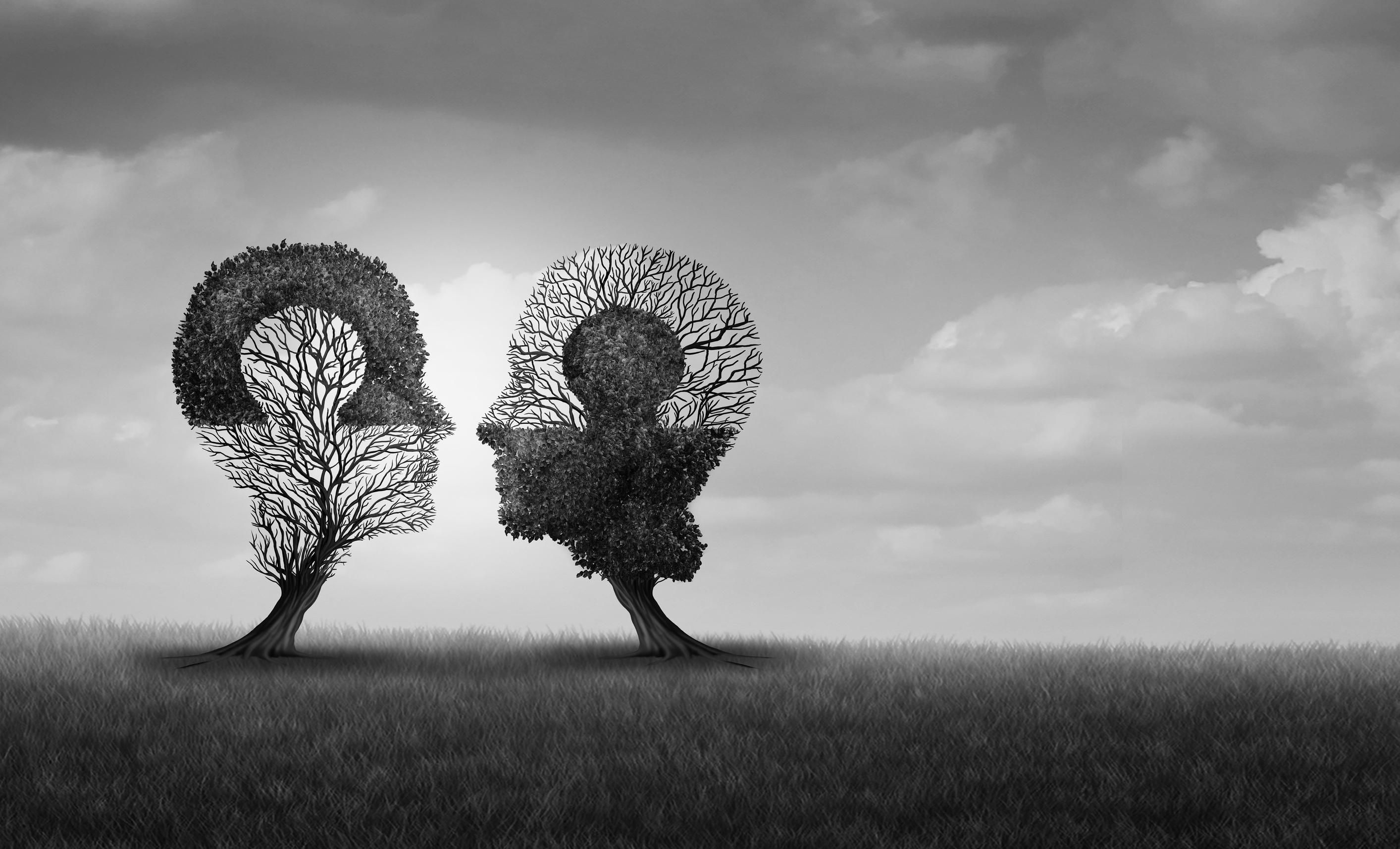



Relationships as a category examine Relationships as a category examine Relationships as a category examine the dynamics, challenges, and growth the dynamics, challenges, and growth the dynamics, challenges, and growth opportunities in human connections, opportunities in human connections, opportunities in human connections, including romantic, familial, platonic, including romantic, familial, platonic, including romantic, familial, platonic, and professional interactions. and professional interactions. and professional interactions.

This article seeks to show couples how to deal with uncertainties and insecurities in their romantic relationship.
Methods: This piece considers research studies about how insecurities can trigger problems in an otherwise healthy relationship. Further cited research
shows couples how to build trust and oxytocin's important role in increasing trust between partners.
Communication, comparisons to past relationships, and changing one's perspective are also touched on in this article.
Relationship uncertainty is an unpleasant feeling to have when trying to pursue something serious with a partner.
If an individual is feeling uncertain or insecure about their partner, it could mean they don't fully trust their spouse. It may also be a sign that they are feeling anxious about where the relationship is going. Or it could mean nothing at all.
Insecurity can spring from past relationships or from seemingly nowhere at all. Even if someone believes they've found the person they want to spend the rest of their life with, insecurities can trigger doubt and create problems in a oncehealthy relationship.
Entering a new relationship should be an exciting, happy time in a person's life. But for those who have had bad romantic experiences in the
past, starting over can be a stressful experience.
When an individual experiences uncertainty or insecurity, it can quickly create disharmony between partners.
To begin with, not knowing where the relationship is going creates a lack of accountability between spouses. Can they trust that their partner is being faithful? If one were to lose their job, could they rely on their spouse to help carry the load?
It will be impossible to move forward with a serious relationship without knowing how each partner feels about the other.
Having toxic thoughts about oneself and their relationship may also lower self-esteem. One partner may begin to blame themselves for any problems or doubts they're having regarding their relationship. This can create a downward spiral of depression.
Here are 7 ways to prevent uncertainty and insecurity from ruining a good thing.

Communication is the key to feeling comfortable in a relationship.
If something from one's past is bothering them or bringing up old insecurities, this person should speak openly with their spouse about it. They won't be able to move forward with a healthy, happy partnership unless they share what is truly bothering them.
Partners feeling uncertain about the future of their once-healthy relationship should sit down and have an in-depth talk about where things are going. This conversation need not be scary or nerve-wracking.
Couples should ask each other how they feel about the relationship. Do they have long-term goals of marriage or starting a family?
How serious are they about being monogamous? Are they comfortable if either person in the relationship still communicates with a past love? These are important questions to ask.
One can either sit around worrying about the relationship or they can do something about how they're feeling. By talking it out, couples will be able to comfort one another and get a clear understanding of where the relationship is going.
The best relationship advice for avoiding insecurity in relationships is to stop comparing.
A comparison is the thief of joy. A jealous or insecure partner can drive themselves crazy thinking about their current partner's past relationships. Such thoughts can cause stress and anxiety to build and can lower self-esteem.
If one compares their current partner to their ex or compares themselves to their spouse's last relationship, they'll soon become miserable. Partners should enjoy each other for who they are, not who they wish to be.

Trust is essential for a healthy relationship. Partners who trust one another experience less stress and anxiety because they don't have to worry about how they feel for one another.
Couples can work on building trust by enhancing their physical intimacy. Studies show that oxytocin increases trust between partners. This bonding agent is released during skin-to-skin

contact with a loved one and is highly beneficial for a marriage.
If one spouse is feeling uncertain about their relationship, doubt and fear can make it difficult to ask the important questions that could resolve the issue. In order to build a healthy
relationship, partners must each do some personal reflection and find out what is truly bothering them.
Here are just some of the reasons why individuals grow uncertain about their romantic relationships:
• One partner wants to start a family but isn't sure how serious their significant other is about marriage and settling down
• Past romantic experiences are triggering a negative outlook on a current relationship
• One partner does not treat the other well
• Anxiety blooms when one spouse realizes they are not in love with their partner anymore
• There is no trust in the relationship
If some are focusing so intensely on their relationship that they're making themselves feel insecure or anxious, a shift in focus becomes necessary. The best relationship advice for embracing independence is to maintain hobbies and friendships away from one's spouse. Doing so will help foster healthy independence.
When individuals focus on their hobbies and interests away from their spouse, it transforms them into a more well-rounded person. This independence is an attractive quality that will be good for both their relationship and mental health.
Who doesn't enjoy hearing how special, attractive, and worthy they are? Reassurance is lovely to hear, but
relying on constant reassurance from a spouse in order to feel comfortable in that relationship can be exhausting for both parties.
Changing one's attitude can go a long way toward developing a healthy relationship. Whenever moments of insecurities arise, many find it helpful to list their positive qualities. This paper will serve as a reminder that they are worthy of love and admiration from a partner.
The best relationship advice to avoid uncertainty and insecurity in a relationship is for couples to learn to enjoy each other. They should also strive to keep honest lines of communication open. Doing so will keep both partners on the same page about the relationship.
Sylvia Smith is a relationship expert with years of experience in training and helping couples. She has helped countless individuals and organizations worldwide, offering effective and efficient solutions for healthy and successful relationships. Her mission is to provide inspiration, support, and empowerment to everyone on their journey to a great marriage.


Metaphysical Sciences explore the Metaphysical Sciences explore the Metaphysical Sciences explore the nature of reality, consciousness, and nature of reality, consciousness, and nature of reality, consciousness, and the universe, blending philosophy, the universe, blending philosophy, the universe, blending philosophy, spirituality, and theoretical insights spirituality, and theoretical insights spirituality, and theoretical insights to understand existence beyond to understand existence beyond to understand existence beyond physical phenomena. physical phenomena. physical phenomena.





We all have inner power. Could you be a superhero? Learn the differences between mediumship and paranormality.
We are all spirits and possess an inner power that reflects divine attributes. To

some extent, we all have mediumship or gifts considered paranormal. Whether through the influence of spirits or a physical capability, the fact is that some people are almost like superheroes, possessing incredible powers. Could you be one of them?
Paranormality and mediumship have some conceptual differences despite their similarities and spiritual essence. The French Allan Kardec addressed this in his compilation "The Book of Mediums," defining the concepts surrounding these different manifestations. He was the
author of the five books of Spiritist Codification and the founder of the "Spiritism" religion.
According to his book, mediumship is the ability some people have to serve as intermediaries between the world of spirits and the material world. Although everyone possesses this ability, it doesn't manifest the same way in everyone. Each individual has a unique aptitude for certain phenomena, with some being born with this faculty already evident, sometimes overtly, while others remain dormant throughout life. In any case, a medium is anyone who feels any degree of influence from spirits.

On the other hand, paranormality relates more to physical and psychic effects that science often regards with skepticism. This concept encompasses a variety of phenomena, such as parapsychology, telepathy, telekinesis, and materialization. The main difference is that in paranormality, the influence of disembodied spirits may or may not be present for the phenomenon to occur.
We are all spirits and possess an inner power that reflects divine attributes. To some extent, we all
have mediumship or gifts considered paranormal. Whether through the influence of spirits or a physical capability, the fact is that some people are almost like superheroes, possessing incredible powers. Could you be one of them?
When each of us becomes an active and living book of lessons for those who see our examples, the boundaries of religious interpretation will give way to the new era of brotherhood and peace we're waiting for.
Chico Xavier-Spiritualist
Navigating the vast realm of the unknown can be both intriguing and overwhelming. It's completely natural to question and seek understanding about the unique experiences you might be having. Remember, you're not alone in this journey, and many have walked this path of discovery before you. While paranormality and mediumship might seem different at first glance, they often intertwine, making it challenging to differentiate
between them. But don't worry; understanding these nuances is a journey.
It's essential to approach this exploration with an open heart and mind. Everyone's experience is unique, and what might be true for one person might manifest differently for another.
The universe has its mysterious ways, and sometimes, it chooses to communicate or express itself through certain individuals in ways that might seem out of the ordinary.

If you've been feeling different or sensing things that others don't, it's okay to seek clarity. Here are 8 signs, presented with warmth and understanding, that might resonate with you and help you determine if you possess paranormal abilities:
EXCESSIVE SWEATING IN HANDS AND ARMPITS: It's more than just a physical reaction. If you often find your hands or feet cold and clammy, it might be a sign even when it's warm. Your body could react to energies and spirits around you, making this a potential sign of mediumship or spiritual sensitivity.
PERCEIVING AROMAS: Have you ever caught a whiff of a fragrance with no apparent source? Whether it's a familiar perfume or an unexplained scent, these sudden olfactory experiences might be messages or signs from the spiritual realm.
PREMONITORY OR VIVID DREAMS: Dreams can be gateways to other realms. If your dreams often feel real, provide insights into future events, or carry messages, they might be more than just dreams. They could be your connection to the universe, revealing your paranormal gifts.
PHYSICAL PHENOMENA AROUND
YOU: Lights flickering when you're
around or objects moving without apparent reason can be unsettling. But remember, these occurrences might be energies responding to your presence, indicating a strong connection with the unseen.
Being able to deeply sense or understand someone's feelings, even without them expressing them, is a gift. If you often find yourself overwhelmed by others' emotions or can detect insincerity easily, you might be an empath or have a heightened sense of intuition.
SYNCHRONICITY: Those "coincidences" that don't feel like coincidences? They might be the universe's way of communicating with you. Repeated patterns, numbers, or events that seem too orchestrated might indicate your connection with the cosmic realm.
READING THOUGHTS: If you often finish people's sentences or know what they're about to say before they say it, it's not just a guess. You might be tapping into their energy or thoughts, indicating a deeper connection with the points around you.

A strong intuition, a feeling of being guided, or a feeling that you're not alone might indicate your deep-rooted connection with the cosmos. This bond can be a guiding light, helping you navigate life's challenges.
Remember, these signs are just guidelines. Everyone's journey is personal and unique. If you resonate with any of these signs, it might be beneficial to explore further, perhaps with guidance from trusted spiritual mentors or by delving into personal reflection. Embrace your journey with love, patience, and understanding. Your gift, whatever it might be, is a beautiful part of who you are.



Astrology is more than just horoscopes. According to Kabbalah, it is an energetic key to all areas of life. It can help us understand and relate to the people in our lives in entirely new ways, give us
deeper insight into ourselves, and offer monthly opportunities for transformation. Based on ancient writings that date back 4,000 years, Kabbalistic astrology paints a picture of our spiritual DNA and offers clues to our soul’s unique destiny.

One aspect of Kabbalah that many might not readily know about is the major role that astrology plays in its concepts and teachings. The Kabbalists’ view of astrology is incredibly interactive and supportive. While it differs slightly from mainstream or Western astrology, it is a tool anyone can apply to their life.
Kabbalistic Astrology is essential in navigating all of the different
interpersonal relationships we have in our lives, from professional to romantic, parenting to friendships.
Because each sign carries certain characteristics, we are given information on how best to communicate, give, and receive from each person, depending on their sign.
For instance, knowing that Cancers are inherently sensitive and come with enormous emotional depth, approaching a difficult conversation with gentleness is something you

can prioritize when communicating with them. Conversely, a more forceful and straightforward approach might be required to get through to an action-oriented sign like Aries.
Beyond these interpersonal tools, Kabbalistic astrology can be invaluable for self-knowledge. Knowing that certain challenges are endemic to our signs can bring them to our attention and help us to transform their less-supportive energies. For instance, a Virgo might
experience a tendency toward being overly critical and a perfectionist, traits that don’t lead to a fulfilling and happy life! Understanding this, the Virgo will now be able to work against this aspect of their nature and transcend a need for perfectionism without self-judgment (another trait unique to Virgo.)
While many other factors contribute to our character, astrology can provide insights, almost like helpful clues, to further support us in our growth.

When we think about Kabbalistic astrology, it’s important to know the ways that it differs from the astrology behind magazine horoscopes. Firstly, the Kabbalistic calendar is a lunisolar calendar, meaning that the months are based on lunar cycles and the years on solar cycles. For example, each month begins with the New Moon, making the Kabbalistic months different from year to year. (A Scorpio in traditional astrology might be a Libra or Sagittarius in
Kabbalistic astrology.) Each lunar month corresponds to one of the 12 signs of the zodiac, and as such, each month affects us in different ways, offering unique gifts.
At each New Moon or Rosh Chodesh (Hebrew for “head of the month”), we have the opportunity to connect with and harness the energy that that month provides. Kabbalists teach that at the beginning of any month, on the New Moon, all the blessings that we want to manifest for that month can be awakened.

Just as a seed contains the DNA of the entire tree, the first day of the new month contains the DNA of what will be revealed that month.
With each New Moon, we are given a one-day window in which to “plant the seeds” of what we hope to create for the month ahead.
While each month brings an opportunity to draw upon positive aspects, it also offers us a gift through challenging elements. For example, Gemini brings fast-paced thinking and mental activity with it. Those born under this sign are quick to change their minds and have
trouble sticking to something and seeing it through. During the month of Gemini, all of us are subject to this tendency — no matter what sign we were born under. Therefore, by connecting to the powerful energy of a Gemini New Moon, we can take advantage of the burst in mental power while remembering to stay the course.
Behind these useful concepts, Kabbalistic astrology also offers us a powerful and potent map of ourselves and the universe.

The Kabbalists’ study of planets and star formations tells us that we are each born at the precise instant that is best suited to what our soul needs to fulfill our purpose in this world. Moreover, this is not an airyfairy, new-age spiritual practice. It is ancient wisdom, finding its source in the writings of Abraham, some 4,000 years ago, as set down in the Sefer Yetzirah, The Book of Formation.
According to Abraham, the spiritual DNA in our souls is transferred to each of us through the planets of our solar system. Our nature
is determined by the exact time of birth, location, and the position of those planets and stars. It’s no wonder the planets have such an effect on us.
Monica Berg is a teacher and writer who specializes in assisting people to live their most fulfilled lives through the wisdom of Kabbalah. She is the author of Fear Is Not an Option and serves as Chief Communications Officer for Kabbalah Centre International. Follow her weekly blog at rethinklife. Today, stay in touch via Facebook, Instagram, and Twitter.



How Our Good Deeds Come Back to Us
By Humanity HealingExperience the transformative power of karma and discover the 12 laws that govern this universal force.
Usually, when we experience drastic changes in our personality, way of acting, or thinking, we tend
to consider the bad things that happen to us as karma for having hurt someone, deceived others, been selfish, or even thought negatively without any basis. In other words, we find ourselves experiencing a kind of return of all the negative actions we once practiced.
However, it's important to keep in mind that it's not only negative actions that come back on this karmic scale; all our positive, altruistic, charitable, and benevolent actions also return as positive karma in our lives. The association of karma as something negative comes from a natural tendency of human beings to remember negative events more vividly, as being hurt or hurting others tends to leave a deeper mark in our memories than joyful and happy moments.
The best way to understand the concept of what is called karma is to recognize that everything around us has its own energy, just like we do. This means that every time we interact with the Universe around us, these actions produce a unique energy that can be either good or bad. The word karma is literally translated precisely under this concept of "making and collecting the field of physical, verbal, and mental actions." This particularity of the energies generated in each action we take
leads to situations where we may not fully recognize the real harm we cause when we act unfairly toward someone. Each person receives these energies differently; therefore, human beings tend to react much less indifferently when they go through the same situation. By experiencing the other side of the coin, we develop greater empathy for the feelings of others.
At this point, one can better understand what karma and the law of cause and effect mean. They basically deal with balance and understanding, so receiving the return of your actions and experiencing their causes directly is certainly an effective way to understand the magnitude of your deeds.
However, as mentioned, this concept also applies to the positive return of energies, or positive karma, as it is also known. Even though these may not mark us in the same way as more bitter experiences, actions that result in good should produce energies rich in positive charges that will surround us with

a magnetism conducive to happy events.
This idea of positive or negative return, always in accordance with a magnetic aura that we are responsible for creating, demonstrates personal mastery over what happens in our lives and that we should plan for the future, assuming responsibilities without
placing all the weight of actions and decisions on fate.
In Indian culture, the word karma means action. The term, which comes from Buddhism, Hinduism, and Jainism, is also adopted in spiritualism. Basically, karma defines

that for every action, whether good or bad, there is a reaction. An equivalent force in the opposite direction. Learn about the 12 Laws of Karma.
Everything we do has consequences. The law of karma simply confirms this. In other words, we will experience the effects of our actions in this life or in future existences. It is also known in many religions as
celestial justice since it represents that a person receives what they deserve based on their actions.
The first and greatest law of karma is about cause and effect. As the popular saying goes, we reap what we sow, and that is the result of this law.

The law of creation is about living life the way we want it to be. It requires our participation, not just happening. Our inner state is influenced by what surrounds us; we are connected to the Universe within and outside of ourselves.
The law of humility is about accepting that the world mirrors our traits. Even if we refuse to accept what exists within us, it will continue to live with us.
The fourth law of karma, growth, is about change and personal growth. For our spirit to grow, change must come from within us.
We must take responsibility for what happens around us. If something is wrong, you can be sure that the error starts within yourself.
Everything in the Universe is connected in one way or another.

Even when we think it's not, there is a connection and an explanation for everything.
The seventh law of karma says that we must focus and not think about two things simultaneously. As a principle of karma, the Law of Focus emphasizes the importance of directing your mental and emotional energies towards a single point or task. This concentrated effort yields better results in external endeavors and
contributes to internal growth, clarity, and peace.
It's about giving when we believe something is true. We must demonstrate this truth. The Law of Giving suggests that true belief in an idea or value is most authentically demonstrated through the act of giving in a way that aligns with those beliefs. This benefits the recipient and reinforces the giver's values, creating a cycle of positivity and growth.

The Sub law of Reciprocity: In many spiritual and philosophical traditions, giving is seen as a way to create positive energy or karma, which eventually returns to the giver in various forms. This law suggests that what you give to the world, thoughts, actions, or resources ultimately returns to you.
We must always look forward. When we look back, we see old patterns
and old habits. What matters is here and now.
We are responsible for changing our path. Everything repeats until we embrace change. This principle suggests that individuals are accountable for their own development. Stagnation often leads to recurring patterns or situations. Embracing change is essential for breaking these cycles, leading to

personal evolution and attaining new experiences and insights.
By being patient, you will be rewarded. Reward requires work, dedication, and persistence.
The Law of Meaning and Inspiration underscores the importance of infusing our actions with genuine
meaning, intention, and inspiration. It reminds us that the significance we attribute to our endeavors and the positive energy we invest in them can significantly shape the outcomes we experience in life. By aligning our actions with our values and pursuing endeavors that resonate with our true selves, we can lead more purposeful and fulfilling lives while positively impacting the world around us.



Personal Growth encompasses self-improvement and emotional, mental, and spiritual development, focusing on enhancing selfawareness, skills, health, and overall well-being.


YOU DON’T HAVE TO GIVE 100% OR MORE TO EVERYONE IN NEED TO BE OF SERVICE.
At times, it’s okay not to be so available. To stay centered and decompress, you need to leave this world for a while and practice self-care. Give yourself that break. When being of service, consider eachsituationindividually.
Always factor in your own energy level and physical and emotional limitations to assess how much you have to give. These considerations don’t make you selfish. They make you smart. Of course, there are instances when service may involve enormous sacrifice, such as when you’re a caregiver,whichIwilldiscuss.
Generally,though,healthygivingnurtures youtoo.
Many of my patients share a dread: “WhatifpeopleaskmorethanIcangive?
IfeelguiltyifIsay“’no.’”
Here are five strategies from my book The Genius of Empathy to support your healthygiving.
1. Give a Little, Not a Lot
Appreciate the power of offering small gifts: a hug, a flower, a fresh salad, a birthdaycard,threeminutesofyourtime instead of an afternoon. Some people limit their giving to an hour daily. Train yourself to be a high-quality giver in smallerincrementswhenpossible.

Giveyourselfthatbreak. Whenbeingofservice, considereachsituation individually.


If you feel you “should” say “yes” to every request, practice setting limits. You can respond, “I’m sorry, I’m unable to attend, but I appreciate the invitation,” or “Thank you for asking, but I can’t take on more commitments now,” or “I’d love to help, and I only have an hour.” If you feel guilty about setting limits, it’s okay, but set a limit anyway. Changing your behavior and acting “as-if” can precede an attitude shift. Youdon’tneedtobeguilt-freetosetlimits.
It’s not healthy to be on call for others all the time. To preserveyourenergyforminutes,hours,orlonger,turnoff your electronic devices, don’t answer calls, and stop “doing favors” for others. This gives you a break to be demand-free. It may be surprising to realize that most peoplecansurvivewithoutyouforawhile.


Yourpresenceisthe mostpreciousgiftyou cangivetoanother humanbeing.
MarshallB.Rosenberg
There are some limits to giving that you can’t modify because your mental or physical health depends on maintaining them, and there is no way to compromise anymore. One friend told me, “I divorced my husband because I never wanted children and realized he’d always be one-a really high-maintenance one.” This was a positive decision for her. Sometimes, protecting yourself requires a big change. Though achieving closure can be difficult, it’s wise to lovingly acknowledge, “It’s time to move on.
Empathyisarespectful understandingofwhat othersareexperiencing.MarshallB.Rosenberg

1.MeditateandPray
When there’s nothing more you can do to help someone, or they refuse help, remember to pray for their well-being and the best outcome to their problem. It’s better to keep this prayer general rather than more specific. In instances when you can’t heal yourself or others--and you can’t get rid of pain--turn the problem into a creative offering to the forces of love and healing. Allow them to work their magic. I also offer my adaptation of The Serenity Prayer, which I suggest too:
Grant me the serenity.
To accept the people or things I cannot change
The courage to change what I can
And the wisdom to know the difference.
If you’re working too hard to help someone, take a pause. Let the person be themselves without making it your mission to improve them. As one patient vowed, “I’m going to stop trying to love the red flags out of others.” There is a time to give and a time to replenish yourself. Healthy giving is graceful and patient, making you smile- a healing gift to yourself and others.
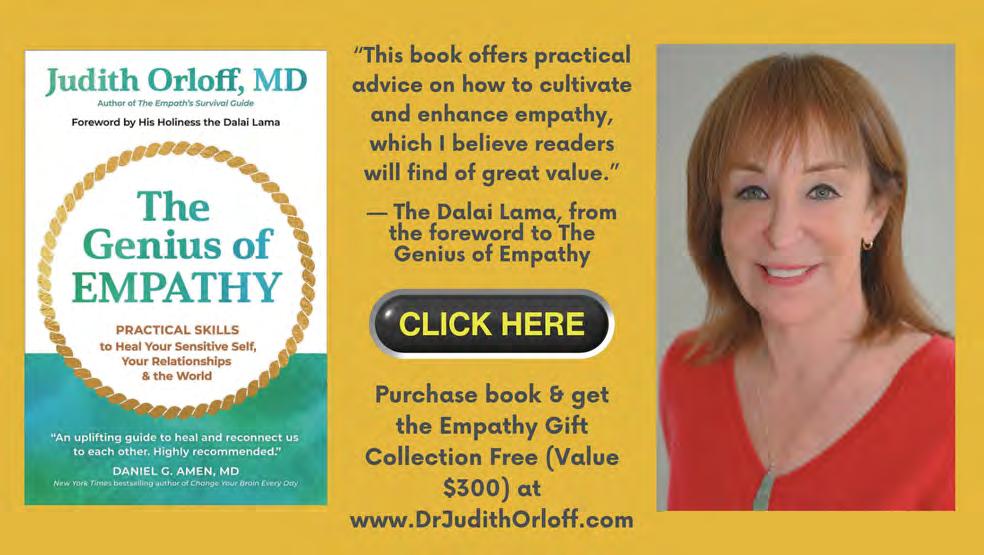
JudithOrloff,MD,isapsychiatrist,anempath,andauthorofthenewbook The Genius of Empathy (foreword by the Dalai Lama), which offers powerful skills to tap into empathy as a daily healing practice in your life and relationships. She also wrote the bestseller The Empath’s Survival Guide.Dr.OrloffisaNewYorkTimesbestsellingauthorandaUCLAclinical facultymember.Shesynthesizesthepearlsofconventionalmedicinewith cutting-edge knowledge of intuition, energy, and spirituality. Dr. Orloff specializes in treating highly sensitive people in her private practice. She hasbeenfeaturedonTheTodayShow,CNN,OprahMagazine,andtheNew York Times. Learn more about empaths and empathy at www.drjudithorloff.com
So you have written a book and are looking for ways to place it before Conscious Readers. You are in the right place!
OMTimes readers ARE Conscious Readers.
A Book Spotlight in OMTimes Magazine and on the omtimes.com website creates impact. Not only is your book in front of a discerning, high-volume, targeted audience, but your OMTimes Book Spotlight will bring you up in the search engines.

Get more Bang for your Buck with OMTimes

Social Media Marketing. To learn more, visit Spotlight Campaigns. Learn







Empathy is no weakness―it holds transformative power to heal ourselves, strengthen our relationships, and amplify our purpose. Dr. Judith Orloff, known for landmark works like The Empath’s Survival Guide, shares an essential new resource for cultivating empathy as a daily healing practice and a form of emotional intelligence. With The Genius of Empathy, Dr. Orloff presents a potent guide not only for highly sensitive people but for anyone with the desire to develop the gifts of empathy that we all possess.
Drawing on insights from neuroscience, psychology, and energy medicine, Dr. Orloff teaches powerful lessons, including:
• Your empathic style―tools for discovering and nurturing your unique sensitivities
• Self-care for empaths―practices to soothe your nervous system to prevent empathy overwhelm
• Setting healthy boundaries to regulate how you process the emotions of others
• How to apply empathy to ourselves to find greater self-love and healing, including from trauma
• Recognizing and protecting yourself from empathydeficient persons such as narcissists, sociopaths, and bullies
• Using empathic listening and leadership in any situation―at work, in your relationships, and in service to the world
Each chapter is filled with Dr. Orloff’s most valuable insights and tools for living with greater connection, safety, and empowerment as your empathic abilities blossom. The Genius of Empathy offers practical, action-driven guidance for connecting our minds and hearts to embody our most authentic, fierce, and compassionate selves.







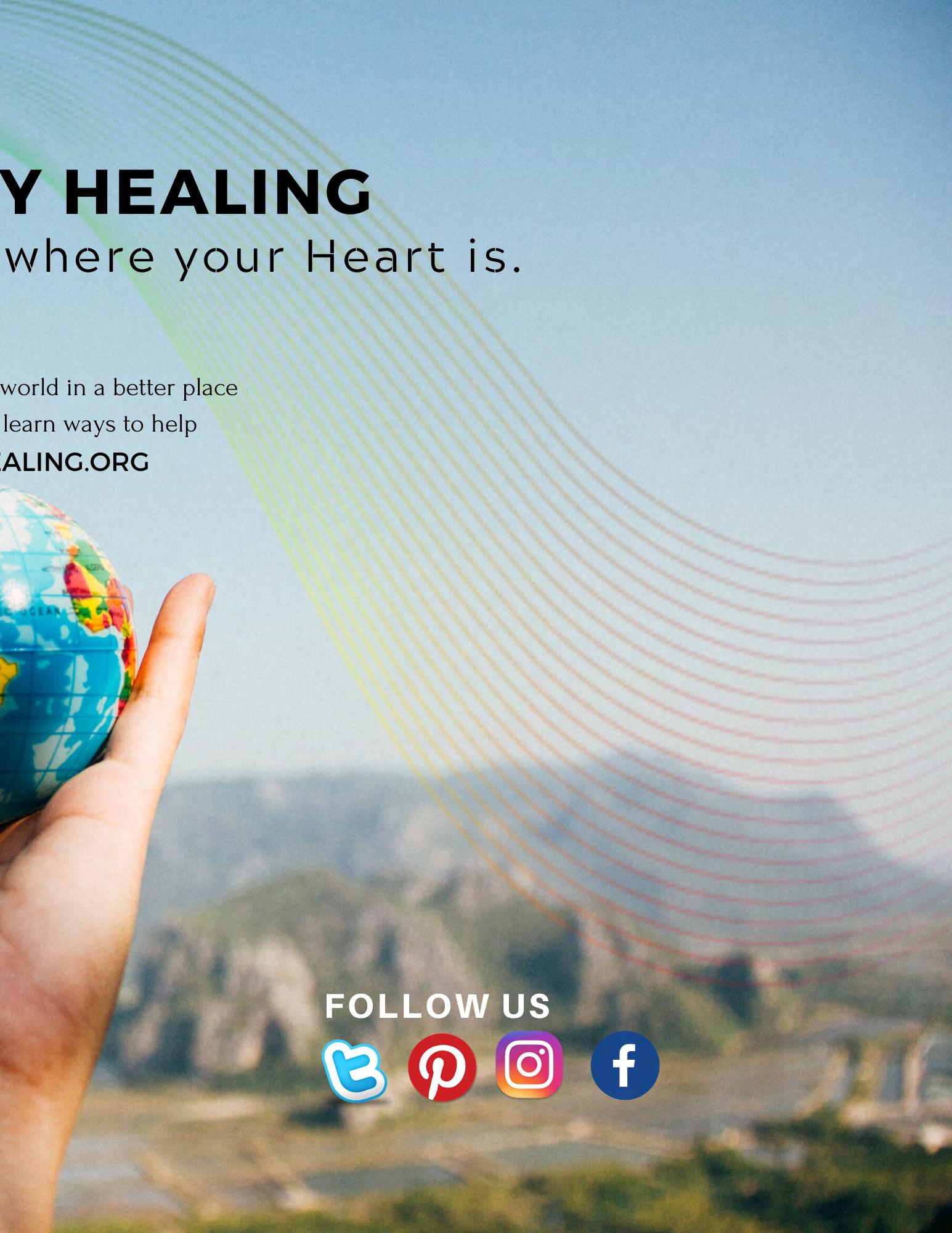
OMTimes Social Media TV
Distribution And syndication
Excellence & Concierge Service
Tv & Radio Integration











